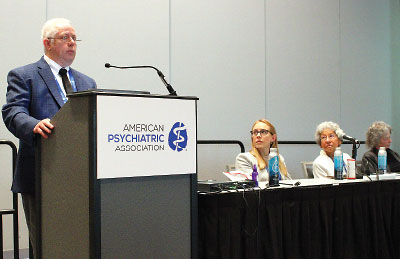Experts Explore Needs of Women as Restrictions on Bodily Autonomy Increase
Abstract
New policies and laws, such as those restricting abortion or gender-affirming care, attack women’s bodily autonomy and severely impact their mental health as well as the environments in which psychiatrists provide care.
Recent legal and policy changes that have restricted women’s autonomy severely impact their mental health. Presenters at a session at APA’s 2023 Annual Meeting explored the challenging environments in which psychiatrists must provide care and the ways that they can promote women’s mental health despite the difficulties.

Evan Eyler, M.D., Ph.D., presents during APA’s 2023 Annual Meeting about the forced masculinization of transgender women and girls.
As laws around access to abortion quickly change state by state in light of the Dobbs vs. Jackson Women’s Health Organization decision, Amanda Koire, M.D., Ph.D., said that psychiatrists must be well equipped to have evidence-based discussions about abortion and mental health, both with patients and the community at large. Koire is a PGY-3 psychiatry resident at Brigham and Women’s Hospital in Boston and founder of the Reproductive Psychiatry Trainee Interest Group. To say nothing when people are spreading myths or falsehoods about abortion and mental heath can seem like agreement, she said.
She reviewed the results of the Turnaway Study, a landmark longitudinal study following women for five years after they had received or been denied an abortion. The study’s main finding was that receiving an abortion does not harm women’s health and well-being, but being denied an abortion results in worse financial, health, and family outcomes.
Further, Koire emphasized that psychiatrists do not need to report patient abortions or thoughts of abortions. “Similarly, it does not fall under existing mandatory reporting for child abuse, even in states with fetal personhood laws,” she said.
Leslie Gise, M.D., a clinical professor in the Department of Psychiatry at the John A. Burns School of Medicine, University of Hawaii, spoke about the ways in which women are more vulnerable to the negative mental health impacts of disasters, including the COVID-19 pandemic, than men due to social and structural inequities. She outlined four areas related to this issue:
Intimate partner violence (IPV): IPV is a public health issue and has been called a hidden feature of disasters. Disasters have been associated with increased rates of IPV, which disproportionately impact women.
The military: For active-duty women, the major source of psychological stress and trauma is sexual abuse, not combat.
Women’s multiple roles: During disasters, caregiving demands increase, the burden of which largely falls on women, while access to resources decrease.
Access to health care:: Our health care system discriminates against women, and this inequity is exacerbated during disasters due to lack of access to care,” Gise said.
Carole Warshaw, M.D., delved into even greater detail about the impact of coercion and IPV on women, especially those with mental or substance use disorders (SUDs). Warshaw is the director of the National Center on Domestic Violence, Trauma, and Mental Health. Experiencing mental illness or SUD places individuals at greater risk of being controlled by an abusive partner, Warshaw said.
Attempting to restrict women’s autonomy over their own lives and bodies is especially evident among transgender women. Evan Eyler, M.D., Ph.D., the session’s chair and a professor of psychiatry at the Robert Larner, M.D., College of Medicine at the University of Vermont, spoke about the forced masculinization of transgender girls by restricting their access to gender-affirming care.
Suspending the forward progression of puberty among transgender girls is the neutral option, Eyler said. He called puberty a runaway train among trans girls. Treatment can allow the patient and family time to gain some cognitive and emotional maturity.
The policies that place restrictions on care for transgender youth and adult women suggest an implicit lack of capacity to make decisions, Eyler said. “The tone of them is that women are not capable of determining their own futures in the way that men are capable of determining their own futures,” Eyler said.
The session ended with attendees breaking up into small groups and discussing how these issues impact their own practices and possible solutions. The attendees pointed to several actions, including making practices trauma informed, educating trainees, and advocating at both the state and federal levels.
Eyler noted during his presentation that the challenges facing women often seem enormous, but there are efforts to fight back. Nonetheless, “at least in the short term, it’s going to be up to us as practicing psychiatrists, people in related fields, and professional societies to do what we can do to keep the ship floating until some more positive changes can occur.” ■



